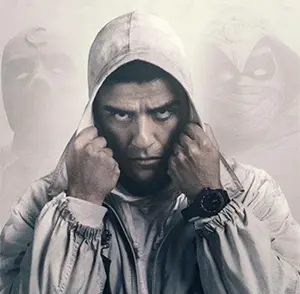Moon Knight's portrayal of Dissociative Identity Disorder may be doing more harm than good
-

The Marvel series has taken great care in portraying Oscar Isaac's magically empowered superhero Steven Grant's Dissociative Identity Disorder, in which someone’s personality and sense of self fragment in response to severe psychological trauma. That includes bringing on a board-certified psychiatrist as a consultant. Moon Knight creator Jeremy Slater has emphasized that he and his producing team want “to be ultimately good and uplifting and have a positive message about mental health.” But, as Charles Pulliam-Moore explains, "it’s interesting to consider what all 'taking care' means when telling thoughtful stories about DID, a disorder whose complicated realities have been eclipsed by sensationalized fiction." Pulliam-Moore adds: "Moon Knight’s far from being the most salacious depiction of DID Hollywood’s ever produced. When you compare it to Iron Fist’s spin on Typhoid Mary — an American army soldier who develops DID as an adult after being captured in Sokovia — it’s a marked step-up for the MCU just by virtue of framing Steven as a troubled man rather than a dangerous villain. But Moon Knight, like so many other stories about DID, is meant to be an exciting story of triumph where the challenges Steven faces push him to become an extraordinary superhuman. Ultimately, that may be the best that these sorts of shows can do. But it’s important to acknowledge the potential consequences that can come from mining these narratives for storytelling’s sake over and over again."
ALSO:
- Oscar Isaac is too good for Moon Knight: The actor "is visibly putting a lot of work into the multiple roles he plays, even though the show does not really have the material for him to work with," says Gita Jackson. "Most of the time, it’s exhilarating, but sometimes, it’s just exhausting, especially when the show itself is not really that interesting." Jackson adds: "None of this is to say that Isaac is doing anything wrong, exactly, by putting real work into such a nothing role (and clearly having a ball doing it), but it’s distracting and weird. As exciting as it is to watch Isaac in Moon Knight, especially as he transitions from one character to the other—sometimes mid-conversation—the show gets a lot worse the instant he is not on-screen, because he’s giving such an overwhelming and energetic performance that not only can nothing else going on compare to it, it doesn’t even seem to be happening in the same universe. It’s in the moments when Isaac is not taking up absolutely all the space on screen that I remember how Marvel shows have let me down before."
- Marvel's house style is holding back what should be a daring story for Oscar Isaac: "Perhaps it’s too much of a generalization to say that the Marvel Cinematic Universe is designed for children, but it’s absolutely designed in a way that isn’t meant to exclude them," says Joshua Rivera. "Even with the MCU’s light geopolitics and frequent friendly gestures toward the military-industrial complex, at the end of the day, the franchise is carefully designed to remain firmly family-friendly, with mostly bloodless violence and nothing too frightening or intense. For the most part, that’s fine. The MCU could arguably be better without its fixation on comic book heroes as paramilitary agents, and every step away from that (like Shang-Chi) is appreciated. However, sometimes the focus on four-quadrant storytelling collides with the ambition of the story in a given MCU installment — as this week’s Moon Knight illustrates."
- Isaac reveals he tried to work a classic meme into Moon Knight
- Moon Knight has become a splintered, Christopher Nolan-esque psychological drama
- Moon Knight has outdone Peacemaker's tragic backstory
TOPICS: Moon Knight, Disney+, Jeremy Slater, Oscar Isaac, Marvel, Mental Health
More Moon Knight on Primetimer:
